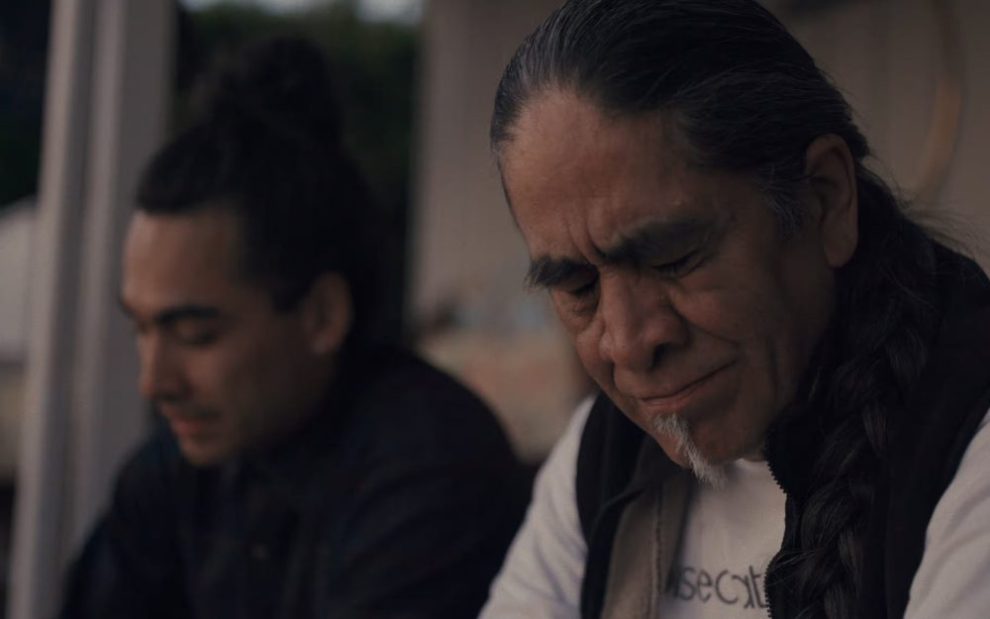Sugarcane
Directed by Julian Brave NoiseCat and Emily Kassie (National Geographic, 2024)
Searching for clues about a past long buried, Charlene Belleau plumbs the archives of a local newspaper. Alongside archeologist and fellow investigator Whitney Spearing, Belleau unearths a brief report—its prose blunt and unemotional—about a startling crime with possibly historic implications for the Indigenous community of Williams Lake, a city in central British Columbia.
August 16, 1959: A newborn baby has been rescued from a garbage burner at the St. Joseph Indian Residential School. The police later locate the child’s mother, who admits that she abandoned her son in an ice cream carton. She is then sentenced to a year in jail. Belleau, a former member of the school’s Cariboo Indian Girl’s Pipe Band, is not surprised. She says her uncle died by suicide at the school. And he was not the only one.
A searing indictment of institutional abuse perpetrated against First Nations’ children by Catholic missionaries, Sugarcane chronicles an intrepid investigation into ghastly crimes committed at a Canadian residential school. But more than a catalogue of horrors that, in slow-burn fashion, develops into a holocaust tale, the documentary depicts the human consequences of generational trauma and the devastating aftermath of abuse toward Indigenous communities. Co-directed by Emily Kassie and Julian Brave NoiseCat, a member of the Secwépemc Nation whose father survived his birth at the school against all odds, Sugarcane follows survivors and witnesses of physical assaults, sexual misconduct and—as the film alleges—“a pattern of infanticide” at St. Joseph’s. (This claim, and the apparent discovery of graves at the school, has been met with controversy and strong denials from some sources.)
The film sets its laser focus on St. Joseph’s, established on a Catholic mission by the Missionary Oblates of Mary Immaculate in the late 19th century. Eager to “get rid of the Indian problem,” as the film states, the Canadian government forced Indigenous children into a boarding school system that robbed them of their ancestral identity and severed their native tongue. “Founded to carry out the genocide of Indigenous people, they created conditions that killed thousands of children,” reads a 2021 op-ed in Scientific American. That article cites the discovery of more than 1,300 unmarked graves on the grounds of residential schools across British Columbia and Saskatchewan.
The adult survivors in Sugarcane, named for a Native American reservation, carry their wounds in separate ways. Rosalin Sam, who says she was sexually abused by a “Father Price” and then beaten by her father, explains how she became an alcoholic. Ed Archie NoiseCat, who spends the majority of the film anxiously attempting to unravel the secrets of his upbringing, left his young son and says he cried every day. “I’ll never forget, and it’s pretty hard to forgive,” says Larry Emile, who claims to have seen nuns toss a baby into an incinerator.
Sugarcane also follows former First Nations’ chief Rick Gilbert, who died in 2023, as he travels to the Vatican for a meeting with Pope Francis. In April 2022, the pope met with representatives of Canada’s Indigenous communities and expressed “sorrow and shame” for the role Catholic clergy played in the abuse. “For the deplorable conduct of those members of the Catholic Church, I ask for God’s forgiveness and I want to say to you with all my heart: I am very sorry,” said Francis in the Apostolic Palace. “All these things are contrary to the gospel of Jesus Christ.” Later, Gilbert visits the Rome headquarters of the Missionary Oblates of Mary Immaculate and meets with the Rev. Louis Lougen, its superior general.
“My mother was abused by a priest and that’s how I was born,” Gilbert tells Father Lougen. There is a long period of silence, his admission hanging in the air, the two men staring at each other. “I’m very sorry,” Father Lougen says. He asks for Gilbert’s forgiveness someday “so that the church can heal.”
Sugarcane joins other major films released last year—RaMell Ross’ Nickel Boys and Tim Mielants’ Small Things Like These—in reckoning with systematic abuse. The Oscar-nominated Nickel Boys concerns crimes committed against children at the Arthur G. Dozier School for Boys in Florida, while Small Things portrays the Catholic-run Magdalene laundries across Ireland, where many women were imprisoned and discarded. Perhaps these films signify a cultural reckoning with historical abuse and a new willingness to listen to survivors, whose stories have been ignored and suppressed for far too long.
Sugarcane is now available to stream on Hulu and Disney+.
An abridged version of this article also appears in the April 2025 issue of U.S. Catholic (Vol. 90, No. 4, page 38). Click here to subscribe to the magazine.
Image: Emily Kassie/Sugarcane Film LLC
















Add comment